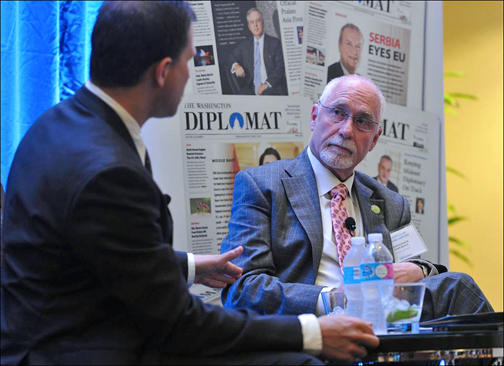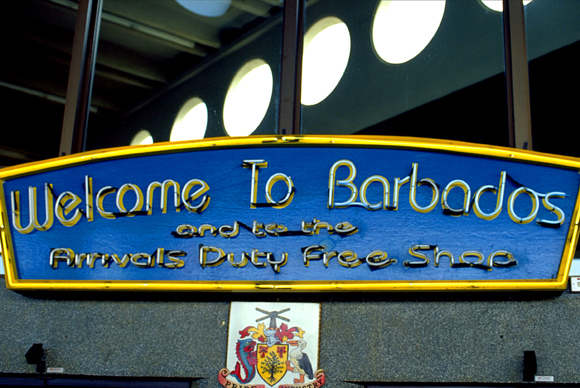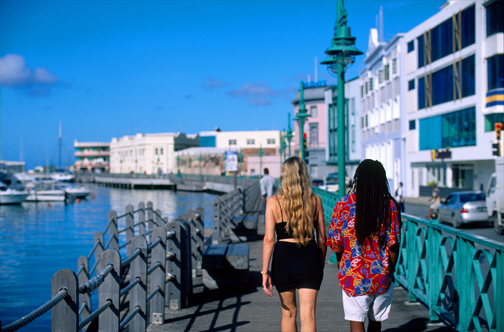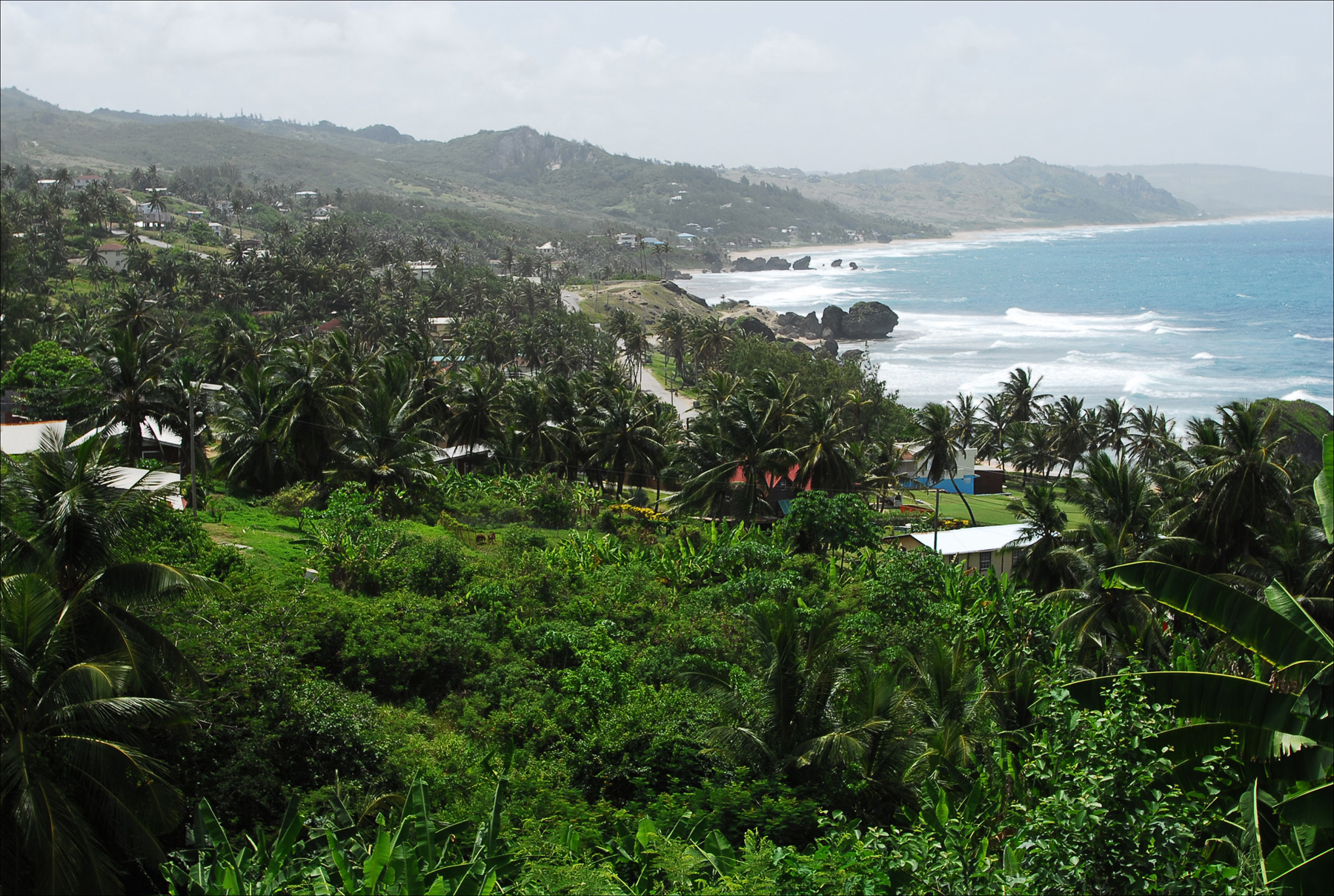USVI defends rum trade perks against mounting Caribbean diplomatic protests
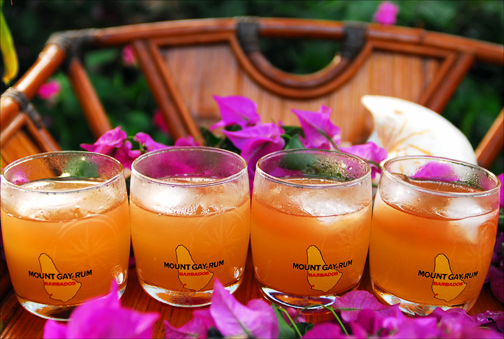

Rum was created in Barbados. It’s a traditional product involving sugar cane, agriculture and manufacturing. If Barbados cannot compete in rum, what can we compete in?,” says John Beale, the ambassador who represents Barbados in Washington. (Credit: Larry Luxner)
Editor’s Note: This is the last of a three-part series News is my Business will publish on the escalating rum tax debate.
WASHINGTON — Donna Christiansen, the U.S. Virgin Islands’ non-voting delegate to Congress, is aggressively defending her territory’s right to use rum excise-tax rebates to lure companies such as Diageo to its shores.
In a recent letter to constituents, Christensen called the accusations against her territorial government “baseless” and denied that Caribbean rum exporters are suffering as a result of the Diageo or Cruzan Rum deals.
In fact, she said, imports of rum into the United States from the Caribbean are up year on year. According to U.S. International Trade Commission data, rum imported to the U.S. market from the 15-member Caribbean Community (Caricom) and the Dominican Republic actually increased over the past year by 12.8 percent in value and 17.5 percent in volume from 2011 figures.
“Moreover, Caribbean producers enjoy many protections from their own governments in the form of tariffs and taxes that are inconsistent with their own WTO [World Trade Organization] obligations,” said Christensen. “Many of the Caribbean rum producers are owned by multinationals similar to those with which the USVI has partnered. Some commentators like to portray this issue as David versus Goliath, but I can tell you that David in this story is the USVI, fighting to grow its own rum industry and keep its economy afloat.”
She pointed out that the USVI, home to only 110,000 people, was hit hard by the recent closure of the Hovensa oil refinery, which had employed thousands of locals.
“This devastating development increased unemployment, decreased tax revenues and caused thousands of citizens to move off the island of St. Croix. As a result, the rum cover-over revenue is providing hope and stability in a time of dire economic need,” she said.
Christensen further warned that efforts by the 15-member Caricom to seek legal action through the WTO “would succeed in causing unnecessary friction and animosity.”
Rum tax controversy divides islands
At the heart of this emotional issue is the U.S. federal excise tax on rum, which stands at $13.50 per proof gallon (roughly $2 a bottle). This amount is collected on all bulk and bottled rum produced in, or imported into, the United States.

Although Guyana’s El Dorado and Demerara premium brands are known worldwide, most Guyanese rum is exported in price-sensitive bulk form. (Credit: Larry Luxner)
Permanent law stipulates that $10.50 of that $13.50 must be returned or “covered over” to the governments of Puerto Rico and the USVI to be used any way they choose. Under the program, each receives a share of the money based on how much rum it produces relative to the other.
Since the Clinton administration, however, temporary law — which expires annually and requires recurring congressional approval — provides an additional $2.75 per proof gallon, meaning the two territories get a total of $13.25 per proof gallon.
How much does all this add up to? Quite a lot. In fiscal 2011, Puerto Rico, which has benefitted from this program since 1917, received more than $449 million in rum excise tax rebates. The USVI, which began receiving similar benefits in 1954, got $133.5 million in revenues in fiscal 2011.
“In Guyana, such a large part of our economic output is agriculture-based, and we suffer from the lack of value-added products,” said Bayney Karran, Guyana’s ambassador to the United States. “Sugar is the largest sector of our economy, and rum adds value. When our exports of rum are affected, it has consequences on employment.”
Guyana, unlike most of its fellow Caricom members, isn’t an island but a poor, tropical South American country nearly the size of Great Britain (and its capital, Georgetown, happens to be home to Caricom’s gleaming new headquarters).
Although Guyana’s El Dorado and Demerara premium brands are known worldwide, most Guyanese rum is exported in price-sensitive bulk form — leading industry leaders to warn that unfair competition from Puerto Rico and the USVI could further impoverish Guyana, where per-capita GDP stands at only $2,700 a year.
“We’re struggling to increase our GDP and develop our economies for the benefit of our people,” said Karran. “It’s hardly acceptable that we would have setbacks because other countries are flouting the WTO rules.”
Brooklyn congresswoman steps in
Meanwhile, the Caribbean ambassadors seem to have found an ally in U.S. Rep. Yvette Clarke, a Democrat who represents New York’s 9th District in Congress.
“The Caricom nations have a very valid concern, and I certainly want to use my office to get to the bottom of the thinking of the USTR,” the congresswoman from Brooklyn told the New York Carib News. “The competition Caribbean rum producers would face because of the subsidies would not make their rum industry sustainable, and at some point we would face a major collapse of the bulk rum industry in the Caribbean if something isn’t done.”
But the issue is more than economic, say the ambassadors.

Various rum brands from the Caribbean (left to right): 10 Cane (Trinidad & Tobago); English Harbour (Antigua & Barbuda); Brugal (Dominican Republic); Rhum Barbancourt (Haiti); Chairman’s Reserve (St. Lucia) and One Barrel (Belize). (Credit: Larry Luxner)
It’s also an emotional one, given the central role that rum has played in shaping Caribbean history for the past 400 or so years. It’s hard to find a country in the region that doesn’t produce its own rum — and these include not only giants like Bacardi and Havana Club but also lesser-known brands like English Harbour (Antigua and Barbuda), Chairman’s Reserve (St. Lucia), One Barrel (Belize) and Black Cat (Suriname).
“Rum creates jobs, taxes and foreign exchange, but in the case of Barbados, it goes even beyond that. It’s a question of psyche,” said John Beale, the ambassador who represents Barbados in Washington. “Rum was created in Barbados. It’s a traditional product involving sugar cane, agriculture and manufacturing. If Barbados cannot compete in rum, what can we compete in?”
Dominican Ambassador Anibal de Castro, who’s also passionate about this topic, said “rum is part of our culture and tradition. It is deeply associated with our history, so when we talk about rum, we’re talking about the Caribbean.”
In 2011, the Dominican Republic exported $120.6 million worth of rum, mainly to Spain, Chile, the United States, Haiti and Italy; the U.S. share of that total was $8.7 million. Rum accounts for 2 percent of total Dominican exports and 7 percent of the country’s agricultural exports — yet that percentage will grow as demand ramps up.
“The Dominican Republic is very much in favor of free trade, and the Dominican rum industry has invested a lot of money in the last few years to improve the capacity and quality of Dominican rum,” said de Castro. “But this is an obstacle to compete on equal terms. This subsidy eliminates the competitive advantage and goes against the rules of free trade. We hope the Americans will pay attention to our demands, and that they will accept that it’s a mistake and will take the necessary measures to eliminate it.”
Adds Guyana’s Karran: “We are in the process of dialogue with the U.S. and we want to resolve the matter in an amicable way. Our objective is to sit down as friends.”

